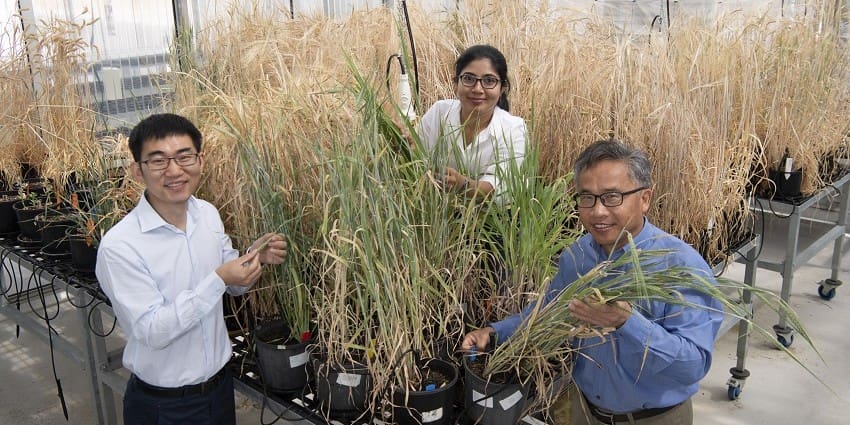
DPIRD research scientist Dr Yong Han (left), Murdoch University PhD student Sakura Karunarathne and Western Crop Genetics Alliance director Professor Chengdao Li have developed new barley lines. Photo: WA Government
NEW barley varieties with improved nitrogen efficiency to help reduce fertiliser use and greenhouse gas emissions are on the horizon, as a result of advances made by a Western Australian research collaboration.
The Western Crop Genetics Alliance, between the Department of Primary Industries and Regional Development and Murdoch University, has used gene-editing technology to lift nitrogen-use efficiency without compromising yield or quality.
The nitrogen content of the new barley lines was up to 50 per cent higher at half the nitrogen rate, when compared with the control varieties in glasshouse trials, while grain yields increased by up to 30pc under typical nitrogen fertiliser application rates.
Benefits of gene-editing
Alliance director Chengdao Li said the CRISPR/Cas 9, or Clustered Regularly Interspaced Short Palindromic Repeats, technology accurately turned barley genes on or off to create the superior trait.
Professor Li likened the use of CRISPR technology to that used by a surgeon during an operation.
“Just as a surgeon uses scissors to remove unwanted material, CRISPR silences or cuts out undesirable genes that regulate nitrogen use,” Professor Li said.
“The removal of these genes delays senescence, or haying off, by 10 to 14 days for grain filling, while increasing chlorophyll production by 50 to 180pc – providing an additional week or two for grain filling.
“This results in increased grain protein and grain plumpness – particularly desired for malting-grade barley – and grain yield, under low nitrogen supply.”
The technique was performed on an old European barley variety, Golden Promise, as well as the Australian variety RGT Planet.
Professor Li said the technique would pave the way to reduced dependence on nitrogen fertiliser, cutting growers’ input costs and increasing profitability, while supporting efforts for the grains industry to become carbon neutral.
Source: WA Government

HAVE YOUR SAY